MARSHALL BWANYA
HUNDREDS of Mount Pleasant Heights Phase 2 (Lot 4 Zizalisari) property buyers are enduring a 17-year land scam which has implicated Anthony Taengwa Parehwa, a local land developer with links to Zanu PF.
Homeseekers have been denied title deeds and crucial documents proving ownership, and now face prospects of repossession of their purchased stands.
Despite efforts to seek intervention from former president Robert Mugabe and former vice-president Joice Mujuru, over 10 years ago, the property buyers are still without a solution.
In March 2015, Parehwa lost Zanu PF’s Hwedza North primary elections to David Musabayana, showing his links to the party.
The housing stands scandal has remained out of the public eye despite desperate attempts by the homeseekers to garner media coverage by approaching several outlets and even the ministry of Information.
The land in question is 84.5383 hectares currently registered under Mazowe Rural District Council (MRDC).
Despite some homeseekers paying for stands in full, at Parehwa’s company, Jockstar Investments (Pvt) Ltd, 17 years down the line, basic infrastructure like roads and water is yet to be provided.
Some of the homeseekers have not received title deeds at a time the developer is demanding extra fees.
This has caused significant financial loss and emotional distress among them. Property buyers who shared their stories accuse Parehwa of demanding exorbitant development fees, resizing stands without consultations and failing to provide title deeds.
This has led to legal disputes and emotional distress among the affected buyers. “We bought our stand in 2010/11 and hoped to start building in 2012. We were then advised to pay US$6 500 before we could build.
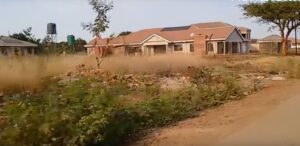
“After paying the fee, it turns out there were no reasonable roads to access the stands nor was there any water reticulation infrastructure as would be expected. Basically the stands were not serviced,” lamented a property buyer who preferred anonymity.
“Possible lost revenue for this period was approximately US$36 000 through unplanned expenditure and what would have been realised from renting out current accommodation as we would have moved to a new house.
“I can’t quantify mental stress which persists even up to now as we do not know if ever the stands will be serviced or if we will get title deeds to the properties,” he added. Netsai, a property buyer, expressed regret over her financial setback and the lost opportunity to benefit from rental income. She highlighted the ongoing mental anguish caused by uncertainty over property ownership and the additional burden of legal fees.
“Buying land from this developer (Parehwa) was a huge mistake which has caused me a huge loss.
“I can’t even quantify the figures, but there was a big loss financially and mentally.
“What I can say is by now I should have finished building that house. Either me staying in the house or letting the house and having an income out of it.
“I don’t have title deeds of the land, meaning the land still belongs to him in a way.
“I still have kids going to school and I could still use that money from that property to improve the livelihood of my children.
“The engagement of lawyers to fight this developer is another loss. I am paying lawyers instead of using the money to build or to start other projects,” added Netsai.
She said her mental well-being has been affected after receiving repossession threats after refusing to pay extra charges, which were not initially stated on her contract.
“To think of it, I’m paying a housing loan to a bank for a property that the developer wants to claim back, saying ‘you didn’t pay developer’s fees, so I am taking it back’.
“Yet my agreement doesn’t say that. It’s something I had acquired through hard work and what I had worked for during my prime years of working. I am now being robbed by this developer,” said Netsai.
How the scam unfolded
An investigation, in collaboration with the Information for Development Trust (IDT) under a programme aimed at empowering under-reported grassroots and marginalised communities, uncovered this web of deceit in the Mount Pleasant Heights Phase 2 project.
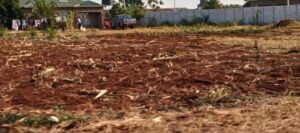
The scheme dates back to 2007, when Parehwa promised swift development and title deeds for stands ranging from 2 000 square metres to 2 700 square metres.
The stands were priced between US$15 000 and US$23 000. However, after selling 351 stands, through Jockstar Investments (Pvt) Ltd, progress stalled.
Many property buyers are battling unplanned expenditure and uncertainty. They are anxious over title deeds.
The stands were to be transferred to Harare once development was completed ahead of title deeds issuance.
The scandal has now attracted the attention of the police
Investigations uncover web of deceit
Investigations reveal that two separate sets of agreement of sale (AoS) were entered into between Parehwa and property buyers.
The first set of property buyers bought stands between 2007 and 2010. Their AoS indicated the purchase price included servicing of the land.
Paragraph 6:6 of their AOS reads: “The seller will be responsible for the cost of servicing the stand.”
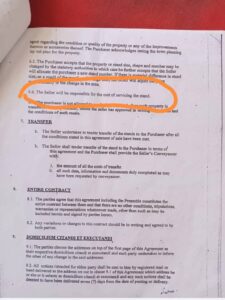
The second group purchased their stands from 2011.
The bulk of their AoS indicated they did not buy fully-serviced stands and would need to pay an unstipulated development fee at a later stage.
The stands were issued under a sub-division application from Shopex (Pvt) Limited with the permit number MASH/C3/2006, which was approved in 2007 by the Local Government ministry’s department of physical planning.
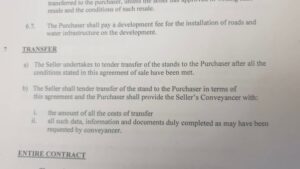
A total of 351 stands were created with stand numbers starting from 2 399 to 2 750, in the area listed as Bannock Township of Zizalisari, commonly known as Mount Pleasant Heights Phase 2.
Property buyers said Parehwa gave them the impression that development would be done immediately.
However, 17 years later, little development has been done.
Documents show that after the stands were sold, IBI Property and Infrastructure (Pvt) Ltd, which is also owned by Parehwa, announced it was the “new” land developer in Mount Pleasant Heights Phase 2.
Through IBI Property and Infrastructure (Pvt) Ltd, Parehwa applied to the Surveyor-General for the cancellation of the general plan by placing an advertisement in the Daily News on 24 August 2012.
The general plan with permit number MASH/ C3/2006, for the properties in Mount Pleasant Phase 2, was originally acquired by Shopex (Pvt) Limited, a company linked to Oniyas Gumbo, the former Zimbabwe Broadcasting Corporation director-general.
Gumbo in August 2011 lost the property after the High Court’s Justice Samuel Kudya ruled in favour of Jockstar and IBI Property and Infrastructure, two companies in which Parehwa is director, following a legal wrangle.
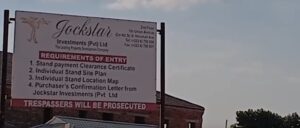
The cancellation of the general plan with permit number MASH/C3/2006 was done without notifying the property buyers who had fully paid the purchase price, as required by law.
Land grab and shrinking stands Following the termination of the general plan in October 2012, Parehwa applied to the department of physical planning at Bindura’s provincial office for a new general plan, which was issued on 25 January 2013 under permit number MASH/C3/2012.
The permit reduced the size of the stands despite the fact that some were purchased as early as 2007.
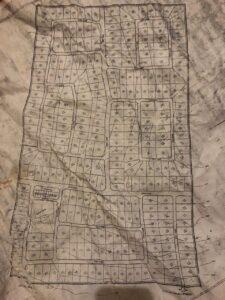
Mount Pleasant Heights Phase 2 residents accuse Parehwa of altering stand numbers and reducing stand sizes by between 200 square metres and 900 square metres under the revised general plan, without consulting them.
Aggrieved property owners protested and tried to access the original general plan (permit number MASH/C3/2006) as part of evidence to show that Parehwa had illegally reduced their stands.
The plan was not found and is still not available at the MRDC offices. T he aggrieved property owners are now accusing MRDC of aiding Parehwa to illegally resize the stands. Asked for comment, MRDC chief executive officer Liberty Mufandaedza said: “…(as) of now I have no comments.”
After reducing the stand sizes, Parehwa coerced property buyers to pay US$6 500 development costs, including those who had paid for fully serviced stands, by threatening to repossess stands and restricting access to properties.

Property buyers who paid for fully serviced stands were also affected.
Those who complied received new contract letters and a clearance certificate, which included new terms and conditions that reduced the size of their stands and indemnified the developer against any potential legal action related to the new agreements.
Observations carried out during a recent visit revealed that the land developer is yet to develop the area.
The need for development fees was specified in clause 6.7 of the second set of property purchasers’ AoS, which indicated that they would pay for the construction of “roads and water infrastructure.”
The amount was not specified. T he original letter requesting development costs was issued on 14 November 2011.
It indicated that development fees of US$6 500 were “payable over three months” and that “payment” would “speed up progress towards completion” of housing amenities.
The letter also stated that the development would pave way for the registration of title of properties into buyers’ names.
On 19 December 2012, Parehwa wrote another letter threatening homeseekers who had not paid “at least 50 percent of the fees within the next seven days” with cancellation of the AoS and repossession of their stands.
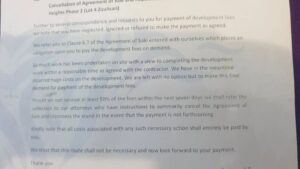
This included the first set of buyers whose AoS did not originally state they had to pay the development fees.
“We refer you to clause 6.7 of the Agreement of Sale entered with ourselves which places an obligation upon you to pay the development fees on demand.
“So much work has been undertaken on site said Mushamba. with a view to completing the development work within reasonable time as agreed with the contractor,” read parts of Parehwa’s letter demanding development fees.
“We have in the meantime incurred huge costs on the development. We are left with no option but to make this final demand of payment of development fees.
“Should we not receive at least 50 percent of the fees within the next seven days we shall refer the collection to our attorneys who have instructions to summarily cancel the Agreement of Sale and repossess the stand in the event that payment is not forthcoming,” added Parehwa’s letter demanding development fees.
Property buyers try to resist On 1 June 2013, over 100 property owners formed the Mount Pleasant Heights Residents’ Association (MPHRA) with the goal of engaging the developer on a variety of issues, including AOS violations, reduced stands, and slow progress towards the completion of housing amenities that the developer was supposed to provide.
MPHRA members said efforts to engage Parehwa were ineffective since he out-maneuvered the residents’ association by engaging home buyers individually to ensure they did not have a unified position.
Parehwa refused to engage the residents’ association, arguing it did not represent the interests of the property buyers.
To rally other property owners in the fight against Parehwa’s contractual breaches, the association on 11 July 2013, issued a public notice in The Herald, inviting them to a meeting on 13 July 2013.
Parehwa, on 12 July 2013, however issued a Press statement in The Herald, describing the association as a rogue group.

He threatened homebuyers and potential property buyers against engaging MPHRA.
“…While we respect freedom of association and the airing of genuine concerns or grievances by bonafide purchasers, we find it unacceptable that our commercial reputation could be subjected to unwarranted attacks which are based, in our view, on misconceived perceptions,” reads part of Parehwa’s public statement.
In response to inquiries about why the government approved the cancellation of Shopex (Pvt) Limited’s sub-division application Permit No. MASH/C3/2006 which was done without notifying property buyers and subsequently approved the general plan under permit number MASH/C3/2012, which resulted in the resizing of stands, the chief director for spatial planning and development in the ministry of Local Government, Shingirayi Mushamba, provided a detailed report.
“Zizalisari Lot 4 which is 84.5383 hectares in extent was initially registered in the name Shopex (Private) Limited when the first application was made on the 7th of December 2006.
“The application was acknowledged on the 14th of December 2006 and registered as MASH/C3/2006 in the Provincial Subdivision Register. An advertisement was placed in the Herald of 13th February 2007 to account for the Change of Use since the property was not yet incorporated.
“On the 24th of May 2007, a Permit was issued to Shopex (Private) Limited. On the 3rd of September 2007, the Applicant advised of their intention to have the Permit canceled for the Proposals were now completely varied from their taste and they indicated intention to make a new application,” said Mushamba.
Mushamba said wrangles for property ownership between Shopex (Private) Limited and Jockstar Investments (Private) Limited arose on the 19th of September 2007, with the former pushing for the cancellation of the permit, with the latter opposing the same.
“On the 10th of April 2008, Amendment proposals were received which were based on stand number discrepancy and this resulted in the Permit re-issued on the 17th of June 2008.
“The office received a further application for PERMIT AMENDMENT on the 18th of July 2012, this time from the new owner, IBR Property and Infrastructure (Private) Limited.
“We are not privy to the period when the ownership changed. The application was acknowledged on the 20th of July 2012 and Head Office was engaged on the proposal on the 17th of August 2012 who then advised that the application cannot be treated as an amendment for there was material change to the circumstances,” Mushamba’s comments failed to explain why the Local Government ministry cancelled the general plan and approved a new one, MASH/ C3/2012, which resized the stands of property buyers in violation of their AoS.
“This was owing to the new configurations of the stands in terms of sizes and units. On the 3rd of October 2012, the Surveyor-General advised of the Cancellation of General Plans relating to the previous permit, that is to say, General Plans,” said Mushamba.
“…Consultations for this new application began on the 10th of October 2012 resulting in the Permit MASH/C3/2012 being issued on the 25th of January 2013. The Applicant later faced challenges in respect of Development monitoring as Harare City were refusing referring them to Mazowe Rural District Council.
“This resulted in the Applicant applying for an Amendment of the Permit to give Mazowe Rural District Council express role to monitor development as the land had not yet been incorporated. The Permit was amended on the 20th of December 2016.”
Property buyers’ plight After issuing the public statement and discouraging other property owners from attending the MPHRA meeting in August 2013, Parehwa continued re-pegging the original 351 stands without engaging property buyers.
Forty-three additional stands, with some reduced to between 1800 and 2000 square metres, were created.
Parehwa installed boom gates and deployed guards to regulate entry to the area. Property buyers who had not paid development fees were barred from accessing their property.
A property owner, who only identified herself as Nyarai, said she was victimised after declining to sign an addendum to her contract.
The addendum sought to indemnify Parehwa, for resizing the stand and also required her to pay an additional US$6 500 in development fees.
“In 2010, I purchased a property from Jockstar Investments for a total cash price of US$15 000 which was the full purchase price with no outstanding development fees.
However, in 2012, I received mail with an addendum to pay for development fee, which I did not agree to as I had already paid the full purchase price unlike others who had paid in local currency the previous years before the country dollarised.
“I made several visits and phone calls to his offices but never had a chance to meet him or get a response and in 2022 I was served with summons from the High Court of Zimbabwe wherein Parehwa said he had canceled the agreement because I refused to pay the development fee,” said Nyarai.
Nyarai expressed frustration that her property size was reduced from 2 000 square metres to 1800 square meters without explanation or compensation. She said the double standards had caused her financial and emotional strain as well as anxiety about potentially losing her stand. Nyarai also fell victim to double allocation.
“Around the same time (Feb/March 2022) I was approached by the brother of a certain lady who is in the United Kingdom claiming to have purchased the same property the previous year,” she said.
“I had already started putting my building material on the site and due to the ongoing legal dispute I have been unable to develop my property. My building material is lying idle.
“…My mental health has been affected heavily because of the possibility of losing the property that I have worked for all my entire life.
“My heart bleeds, it hurts, it’s painful.”
National police spokesperson Commissioner Paul Nyathi said police were investigating five cases involving Parehwa.
“The Zimbabwe Republic Police is investigating five land scam cases involving Antony Taengwa Parehwa.
“However, we have not yet received cases in respect of relentless financial demands from unsuspecting property buyers and reduction of stand sizes purchased by the clients,” said Nyathi.
Despite Parehwa successfully coercing hundreds of property buyers, a property buyer, Tendai Makombe and his spouse successfully took legal action against him under case number HC 5489/17 for breaching the original agreement of sale which resulted in the reduction of their property by 400 square metres.
Justice Edith Mushore on 30 October 2019 ruled that Makombe should be compensated US$2 593 to be paid in two equal installments.
“It is hereby declared that the boundary lines of plaintiff’s structures lie within the boundaries established by the Surveyor-General in its Survey Report on Stand 2858 Bannockburn Township of Lot Zizalisari, Salisbury District dated May 2018; and that those boundary lines shall so remain; without lawful encumbrance,” Mushore said.
Mujuru’s intervention After witnessing Parehwa re-pegging stands with impunity, MPHRA wrote a detailed report to the former vice-president Joice Mujuru, which was copied to former president Robert Mugabe on 21 January 2014.
The association lamented howParehwa illegally re-pegged the stands and pleaded for government intervention.
“The beneficiaries (property buyers) then noticed in August 2013 that the developer (Parehwa) had undertaken a concentrated re-pegging of our stands, effectively reducing them in size, thus creating more stands for himself.
“At no stage of the process did the developer engage the beneficiaries to inform them of these developments as specified in terms and conditions of the AoS contracts,” read the letter to Mujuru in part.
A month after the report was sent to Mujuru, MPHRA leaders and Parehwa were summoned to Harare Central Police Station, where the police said they had received a letter concerning the land disputes between the two parties but did not state its origin.
Following the police interview, Parehwa temporarily withdrew, preventing property owners business practices. from accessing their stands for two weeks before resuming restrictions on property buyers who had yet to pay development fees.
MPHRA on 13 February 2014 also wrote to the then minister of Information professor Jonathan Moyo, lamenting that the local media was ignoring the land scam.
No action was taken, prompting a homeseeker to write a second letter on 27 March 2014.
“We have tried to have this issue covered in four newspapers whose reporters interviewed the courageous members who took major risks and in some cases visited the site to substantiate the story.
“Unfortunately this story has fizzled out in all these newspapers without being published thus The Herald, NewsDay, Daily News and the Zimbabwean Mail,” reads part of the letter.
Combined Harare Residents’ Association (CHRA) director Reuben Akili said there was a need to take action against unscrupulous property developers-cum-land barons that are taking advantage of desperate home seekers.
“Our message has been very clear on this matter that we have land barons and extortionists masquerading as property developers, these people take advantage of desperate and ignorant house seekers.
“Residents must organise themselves, report to police and drag these so-called ‘developers’ to the courts for the purposes of obtaining justice and redress or recourse,” said Akili.
Some property buyers lamented that Parehwa was currently demanding payment of US$13 000 from property buyers for conveyance, which includes an additional US$6 000 for capital gains tax.
The property buyers argued that Parehwa did not have legal authority to demand this payment from property owners, stating he profited from the sale of 351 and 43 additional stands.
Parehwa’s mounting legal woes Parehwa is currently at the centre of a web of complex legal battles, including: HC8237/2016, HC4746/2014, HC6804/2013, HC1626/2014: HC8167/2013, HC6663/2013, HC2099/20, and HC7488/20, raising questions about his business dealings.
The separate court cases highlight potential conflicts surrounding property ownership, contractual agreements, and transparency in his In case HC 2099/20, a company named Graniteside Electrical Hardware (Pvt) Ltd accuses Jockstar Investment (Pvt) Ltd, of failing to transfer ownership of land despite a completed agreement.
Graniteside Electrical Hardware (Pvt) also included IBI Property and Infrastructure (Pvt) Ltd, another company linked to Parehwa, in the lawsuit.
While the court dismissed Graniteside’s initial claim against IBI due to a flawed filing, it allowed them to amend the lawsuit and potentially hold IBI accountable.
In case HC7679/23, Jockstar Investments (Private) Limited, sought a stay of execution pending the determination of an application for rescission of judgment.
The respondent, Chipa Muzirwa, had previously obtained a default judgment against the applicant, which the applicant sought to rescind. Jockstar Investments (Pvt) Ltd and Muzirwa had entered into an agreement of sale of stand number 2654 of Zizalisari Lot 4 Bannockburn Township Harare.
The material terms of the agreement were that Muzirwa would pay the purchase price of US$17 000 for the stand and an additional US$6 500 development fee.
A clause provided that the stand size, shape and number might be changed.
The applicant undertook a tender transfer of the stand after all the conditions in the agreement had been met.
Muzirwa paid the purchase price of US$17 000 and development fee of US$6 500.
Jockstar Investments (Pvt) Ltd proceeded to issue a certificate of compliance in 2018.
On 30 June 2022, Jockstar Investments however, issued summons against the Muzirwa under case number HC 4309/22 alleging that although the respondent had duly paid what was due in terms of the agreement, there was now a variation in the stand size from 2015 square metres due to the Surveyor-General’s work to 2002 square metres.
Jockstar Investments in this case alleged that Muzirwa had refused to accept the adjustment to the stand size and the applicant had duly informed her that they were proceeding to cancel the agreement.
Justice Emilia Muchawa on 19 January 2024 dismissed Jockstar Investments’ urgent chamber application seeking a stay of execution.
Justice Muchawa found that the applicant’s founding affidavit lacked averments on prospects of success and failed to attach the application for rescission.
The court further criticised Jockstar Investments for material non-disclosures and a lack of candour, including misrepresenting the timeline of their application for rescission and failing to explain why they did not apply for upliftment of the bar in previous opportunities.
The case, HC 6560/19, involves a property ownership battle in which Unitime Investments claims legal ownership of a property based on a 2002 purchase agreement with Parehwa and a registered title deed.
However, another couple possesses a conflicting title deed for the same property, registered later.
Unitime alleges the second title deed is fraudulent due to a potential clerical error and possible misconduct by a conveyancer.
Attempts to contact Parehwa for comment on the contractual breaches and resizing stands allegations presented by property buyers were futile, as his phone went unanswered after repeated attempts on various dates in the months of June and July 2024.
He did not respond to WhatsApp messages addressed to him. Webster Jiti, Parehwa’s lawyer, when we first reached out to him for comment in June 2024 on the allegations that his client illegally altered stand sizes and breached contractual obligations, he gave the impression that he would comment on the matter, but insisted he was busy attending a family funeral and would comment after the bereavement.
A week later, after the funeral, Jiti shifted goal posts and said he was not in a position to comment unless his client gave him authorisation to comment on the matter, a matter he never mentioned when he first said he would comment after the family funeral.
Jiti, after several days, went on to state that he was denied authorisation by Parehwa to speak on the matter, thus could not comment on the allegations levelled against his client.
The interconnected lawsuits, however, paint a picture of potentially questionable business practices surrounding Parehwa.
This story was commissioned by Information for Development Trust (IDT) and first published by The Newshawks

